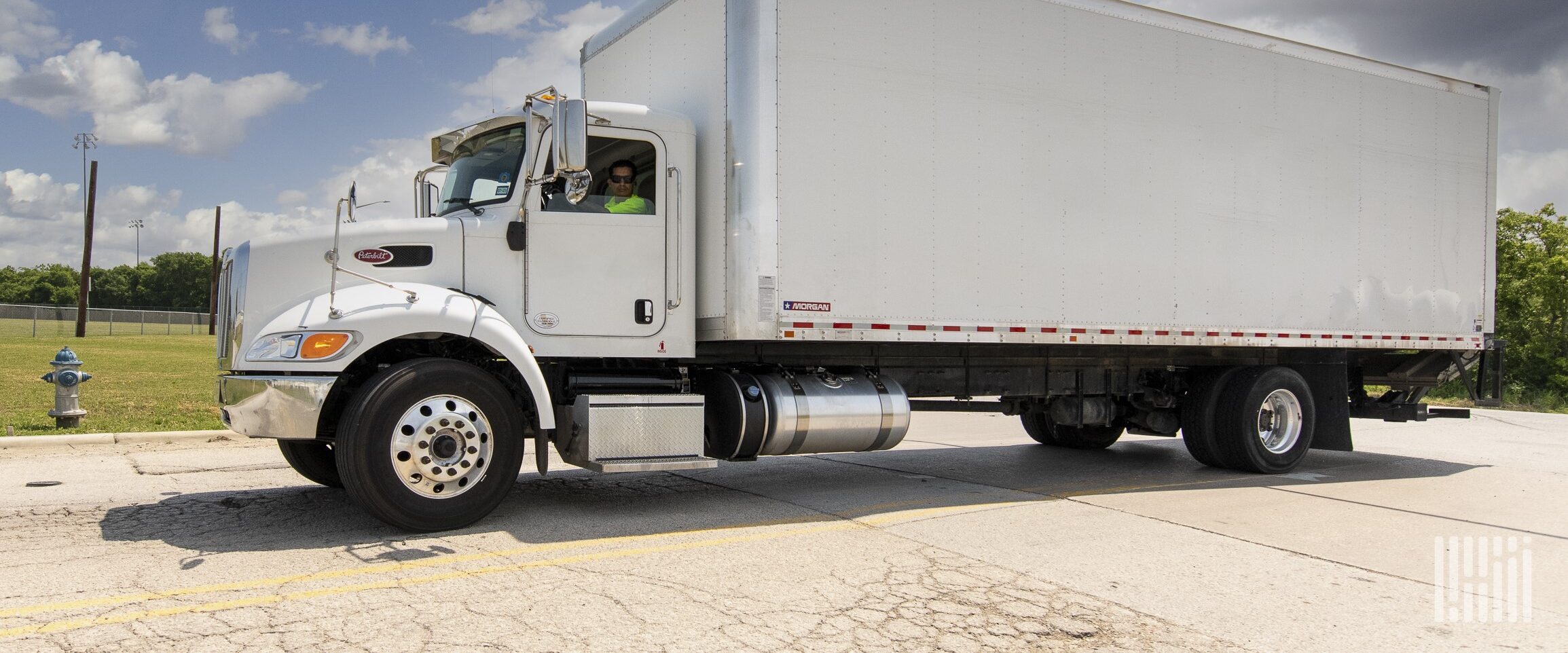Optimal dispatching is essential for keeping box trucks productively utilized and revenue flowing. However, with countless dispatch providers claiming superior coordination, selecting the ideal logistics partner can feel overwhelming.
This article provides seven critical considerations when vetting box truck dispatch providers to meet your specific needs.
And when you’re finished reading, check out these other articles in our ‘How to become a box truck owner operator’ series:
- 9 steps to become a box truck owner operator
- How much does box truck insurance cost?
- Best box truck financing options
- 7 tips for evaluating box truck dispatch services
What is a box truck dispatching service?
A box truck dispatch service is a company that coordinates the shipping and transportation of goods using a fleet of box trucks. Box trucks, sometimes called straight trucks or cube vans, are medium sized delivery trucks typically ranging from 16 to 26 feet long with an enclosed, box-shaped cargo area.
Box truck dispatching companies work with customers who need to transport or deliver items too large for a standard delivery van but too small for a semi truck, such as small wholesale goods, furniture, trade show displays, and other equipment. A box truck dispatcher maintains a network of reliable drivers and matches their availability and routes with customers needing transport.
When a customer has a job requiring a box truck, they contact the trucking dispatch company with details like cargo type and quantity, origin and destination addresses, and time frame. Truck dispatch services use truck dispatching software and experience to determine the best match from their pool of drivers.
Trucking dispatch companies coordinate the schedule so the driver arrives on time with the right size vehicle to safely make the delivery. Additionally, box truck dispatchers handle tracking and communication so the customer has a seamless experience.
A dispatch truck service typically bills per job based on factors like mileage and may offer subscription plans for frequent shippers. With an on-demand box trucking dispatcher handling logistics, their customers can focus on their business while shipments are reliably transported.
Who should consider using a service for dispatching trucks?
The following drivers and trucking companies could benefit from a trucker dispatch service.
Independent box truck owner operators
Owner operators can gain access to more consistent shipping volumes and revenue. A trucking company dispatcher helps find loads aligned with drivers’ specific capabilities and needs. Getting dispatched loads reduces downtime and the hassles of load-finding.
Small box truck fleets
Outsourcing load procurement and planning to a dispatcher for truck drivers allows companies running small fleets of five to 25 vehicles to focus on their operations. The best box truck dispatch service enables business growth without the usual headaches of scaling.
Regional trucking firms
Even some medium and large trucking companies partner with dispatch services for box trucks specifically for help with routing and small freight optimization. This strategy leverages the expertise of box truck dispatch companies for niche load requirements.
LTL carriers
Less-than-truckload (LTL) carriers use box trucks for multi-stop routes. Quality dispatching for box trucks maximizes load consolidation opportunities within their box truck network.
Start-up trucking companies
Younger trucking operations can rely on a reputable box truck dispatcher service to book solid early loads while working out other logistical challenges facing new carriers.
In general, any company using box style trucks that wants to improve efficiency, increase driver jobs and revenue per truck while avoiding dispatcher headcount finds value in outsourcing to an expert in dispatching box trucks.
Benefits of box truck dispatching services
Using box trucking dispatch services can offer significant advantages. Here are some of the main benefits.
- Increased truck productivity: Trucking dispatchers keep trucks moving with a constant flow of booked loads so less time is spent searching/sitting idle.
- Access to more shipping customers: Established dispatch for trucking services leverage connections with manufacturers, retailers, and other shippers needing reliable box truck capacity.
- Operational flexibility: No long-term contracts, so trucking firms can choose to exclusively use a dispatcher for box trucks, or leave trucks open for other opportunities.
- Revenue growth potential: With dispatchers for box trucks continuously filling schedules, companies see both increased truck usage and higher lifetime revenue per truck.
- Reduced administrative burden: Dispatch services for trucking handle communicating with shippers and drivers, load planning, billing, etc., leaving trucking leadership focused on fleet ops.
- Driver retention and satisfaction: Keeping drivers active with regular freight contributes to driver happiness, reducing turnover.
In summary, outsourcing dispatch for box trucks empowers carriers to scale smartly while ensuring their expensive box truck assets remain profitable.
7 considerations when deciding on a dispatcher for trucking
If you’ve decided to use a service to dispatch trucks, there are several key elements to consider. Take the following seven points into account when looking for the best dispatching companies for box trucks.
- Cost: What are the monthly or annual fees for the dispatch service? How many trucks/drivers will rely on them? Weigh costs against expected increase in bookings.
- Experience: Examine years in business, fleet sizes served, and customer reviews. More experience brings better shipper connections.
- Specialization: Does the dispatcher focus specifically on box trucks rather than all freight? Specialization usually means better networks.
- Technology platform: Evaluate the provider’s box truck dispatch app or software for booking loads, route optimization, mobile capabilities. More automation means greater efficiency.
- Compliance assistance: Which resources does the dispatch service offer to help comply with regulations for size/weight limits, locations served and safety standards? This is crucial.
- Communication practices: Assess their communication frequency, response time, and problem resolution process. Quick responses equal happier customers.
- Load diversity: Do they source loads from different brokers, regions and industries? Diverse freight protects against any single market changes.
By carefully weighing these factors against operational needs and finances, companies can determine if outsourcing to a dispatch service is the right logistics strategy for supporting growth.
Grow your business with dispatching services for box trucks
Following these seven essential evaluation criteria empowers you to cut through provider claims to make an informed, ideal dispatcher selection. After establishing clear logistic requirements and priorities for your operation, methodically vet dispatchers on their ability to address those needs. By matching with a dispatch service well-aligned operationally and culturally, you position your company for increased truck utilization, driver satisfaction, and ultimately, long-term profitability.
FAQ
Load boards are a common avenue for finding box truck loads. Another possibility is using box truck dispatch services that specialize in continually finding shipments suited to a specific equipment type and market.
Box trucks can generate strong profits due to their versatility in handling mid-size loads, accessibility to more destinations, and consolidation cost savings over other modes. Maximizing profitability relies on keeping box trucks moving with consistent freight flow.
Quality dispatch services build extensive carrier networks through reputation and effective load/revenue delivery over time. They also utilize some trucker-focused load boards, referrals from existing network drivers, and by monitoring FMCSA licensing data for new carriers to potentially onboard.


